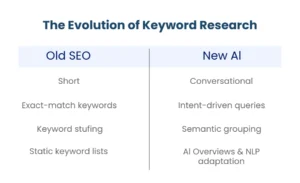The emergence of AI Keyword Research has transformed the way companies interpret search behavior and user intent. Searches using traditional keyword strategies are no longer effective because new search uses semantic search, voice search, and natural language processing (NLP) to provide the most personalized results based on their context. Through AI-oriented tools and tactics, marketers can maximize AI in digital marketing, utilize AI in content creation, and be ahead of the game in a world that is becoming more and more Generative AI in marketing. This blog discusses the way AI changes the research of keywords, the tools, and techniques to use, and the metrics that actually matter.
How AI is Revolutionizing Search and User Behavior
Advancements in AI in digital marketing have dramatically changed how people search online. Simple keywords are not enough anymore: nowadays, modern users demand precise and relevant answers that respond to their unique needs.
The Keywords to Natural Conversations
The emergence of AI Keyword Research and Natural Language Processing (NLP) has transformed the use of search to be more conversational than search by query. As time goes by, users start typing or talking out complete sentences and asking questions as they would in a normal conversation. This development puts pressure on marketers to make content voice-search and semantically understandable, as opposed to individual word-based search.
Learning Lots of NLP
Since AI has learned Natural Language Processing, search engines have learned to decipher the words, synonyms, and meanings behind each search query. An illustrative example is, a user may enter a query, What is the best running shoe to run in with a high arch that is good for trail running, and is not slippery, instead of running shoes 2025.
AI also recalls previous searches, and can be followed up in the manner of, “And what about options less than $150? without losing context. This better interpretation of intent improves the entire search process and enables AI in matters of content creation strategies, which address the needs of individual users.
Voice Search: Conversation Queries Made Easy
The increase in the number of intelligent gadgets such as Alexa and Google Assistant has boosted the use of voice search. It is more convenient to speak naturally than type, and long, question-based queries are encouraged. Companies using AI in Marketing should optimize for these conversational trends to remain visible in search results.
Semantic Search: Searching Beyond Keywords
Semantic search is an AI-based search that extends beyond keyword matching. It understands connections between words, entities, and concepts and makes sure that search results are accurate and speak to the real intent of the user. This causes AI Keyword Research content to be much more efficient as it represents the sense of queries and not the words themselves.
Personalization and User Intent
Contemporary AI agents can infer user intent layers, including whether a person needs to get certain information, wants to buy a product, or is visiting a particular site. Past searches, browsing history, city, and preferences are also used to personalize queries and deliver a more relevant and interactive experience to users.
Contextual Searches and Ultra-Specific Searches
Searches today take into account the where, when, and how a query is conducted. Contextual signals such as location, type of device, and time of day are used by AI to provide correct solutions. More and more common are longer, more detailed searches – as many as seven words. To illustrate it, in place of typing pizza, a user would type, best thin-crust pizza delivery near me open late.
Comparison and Problem-Solution Queries
The users are now often interested in comparisons and practical solutions. Such queries as comparing the camera quality of iPhones and Samsung Galaxy S25, or which CRM is the best among small businesses with fewer than 10 employees. Also, the queries that are problem-solving, like how to solve the problem with email delivery, or how to address the issue with the speed of the webpage, indicate that the Generative AI can be used to generate marketing content that is more specific and beneficial.
Transforming AI Keyword Research with A Modern Approach
Old-fashioned token methods of key search cannot be used in the current AI-driven environment. AI Keyword Research now demands an intent-first approach, which involves the analysis of the user, his or her experience, and the context in which each search is found.
User-Driven Research: Start with the Intent
Rather than using keywords, use the intent of the user. What is it that they are attempting to do? What problems do they want to address? With intent as a priority, marketers are able to develop extremely targeted content and optimize AI in Marketing to correspond to actual user requirements.
Mapping the User Journey
It is critical to comprehend the transition of the user to a decision. Their search habit changes at every phase, and that determines what kind of content and keywords are supposed to be targeted. Semantic search will benefit your research because even when the query is matched, the intent will never be lost.
Finding Real Pain Points
Do not use search volume alone. Use forums, social media interactions, Reddit posts, and support interactions with customers and discover real user frustrations. Examples such as how to fix [whatever is common], or the best ways to overcome [whatever is a challenge] give the AI super opportunities to create content and be solution-specific in marketing.
Anticipating Objections
Research anticipates fears or doubts before decisions are made by users. Questions like: is [product] worth it, [service] disadvantages, or alternatives to [competitor] allow marketers to overcome objections proactively, strengthening trust and engagement with AI in online marketing methods.
Planning Follow-Up Queries
Search is often multi-turn. When a user enters the query best laptops for students, the next search query may be affordable laptops to use in engineering school or MacBook Air vs. Dell XPS to use in college. By predicting post-action questions, it is possible to design holistic content experiences to meet voice search and chatbot interactions.
Semantic Keyword Grouping
AI promotes matching of keywords on a semantic basis and not an exact match. Notions such as content marketing strategy, content promotion ideas, and content repurposing are all part of a more extensive topic of Generative AI in marketing that ensures content is represented at each end of the user intent.
Entity-Based Research
Contemporary AI applications look at things, such as products, influential personalities, places, or concepts, and not just keywords. To optimize the AI Keyword Research, mapping these entities to the needs of your audience assists in aligning the outcome of the Generative AI development services.
Identifying Content Gaps
Compare your current content with user questions and general topics. Are there places that your competitors are doing but you are not? The identification of these gaps helps you develop content that actually meets the needs of users, improving your visibility in artificial intelligence search results.
Artificial Intelligence-driven Citation and Authority Analysis
Competitive analysis is no longer limited to keywords. AI considers the credibility of sources, such as how they are referenced in the generative AI answers or in the people also ask section. The use of this understanding can help AI in digital marketing and reinforce content authority.
Ensuring Content Depth
AI likes detailed information that answers users in detail. Rather than looking at the use of keywords, look at competitor content depth and authority. Address every aspect of a subject matter to please users and make the AI-based search engine more discoverable and valuable.

Evaluating the Influence of AI Keyword Research
In the current AI-driven world, the conventional metrics such as total organic traffic or generic keyword rankings are no longer sufficient to paint the entire picture. Indicators that indicate user intent, discussions, and interaction with more sophisticated AI-based platforms now require attention from the brands.
The most significant AI Keyword Strategy Metrics
There are a number of new Key Performance Indicators (KPIs) that need to be focused on to measure the impact of AI Keyword Research.
Completion Rates of Conversation
Multi-turn queries are now common with the use of AI and voice searching. Monitor the access of users with full answers on your site that satisfy both preliminary and follow-up. This is a measure of the quality of your content in terms of assisting AI with content creation and intent.
AI Citation Mentions
The number of times your brand or content is mentioned by AI systems or generative AI summaries is an emerging measure of AI use in digital marketing. The authoritative position indicated by being referenced is an indicator of trust and enlargement of the presence in AI search results.
Long-Tail Traffic Growth
Longer and more precise queries are motivated by conversational search. Check organic traffic with four or more word queries because they tend to be goal-oriented. Semantic search and Generative AI optimization in marketing is a way to make sure that your content is in line with these detailed user searches.
Interpretation of Search Volume
Raw search volume on broad keywords is losing its relevance. Instead, prioritize queries of high quality and intent. A term with low volume that exactly fits the needs of the user will work much better than a high-volume, broad word in promoting engagement and conversions.
Conversational Snippets Click-Through Rate (CTR)
CTR needs to be divided into the pages, which are tailored towards AI-based conversational snippets, e.g., FAQs. Well-written content that is AI-in-Marketing optimized may result in a higher rate of user clicking through, even in cases where AI previews already contain summarized responses.
Multi-Touchpoint Conversion Attribution
The user experience is seldom linear. AI combines information from various sources; hence, current conversion attribution should consider multi-touchpoints. Knowing the order of queries that culminate in a conversion can offer actionable information to the strategies of AI development companies and Generative AI development service providers.
Assessing Topic Authority
Assess the coverage of the competitors on certain issues. Do they emerge as an expert source for groups of similar questions? When it comes to AI Keyword Research, content showing expertise is always preferred; thus, to increase your visibility and credibility, you can develop topic authority.
Essential Tools and Techniques for AI Keyword Research
The introduction of AI in digital marketing is a crucial phase in the modern AI keyword research that should be leveraged using the modern tools of AI. Marketers are now able to access the platforms that can discover the intent of users, generate long-tail queries, and model conversational search behaviors.
Improved Keyword Research Systems
Conventional tools such as Google Keyword Planner are changing to accommodate AI requirements. These platforms assist the marketer in determining the high-value queries by integrating semantic analysis and intent-based suggestions. Likewise, SEMrush and Ahrefs now offer related keywords, suggestions that look in the form of questions, topic clusters, and do not rely on simple volume indicators to help the AI in Marketing techniques.
Visualizing User Questions
Websites such as Answer The Public provide a visual interface of questions and discussion terms that users seek. This strategy brings into focus the opportunity driven by intent, and the marketer aims to maximize content in voice search and AI-enhanced search experiences.
Capitalizing on Generative AI Tools
Big AI models like ChatGPT and Claude are changing the face of AI in content generation. These tools generate natural language variations of topics, brainstorm long-tail questions, profile user personas, and simulate conversational queries, and can uncover patterns in user searches that conventional methods may fail to detect.
Perplexity AI is an answer engine, summarising complex subjects and giving references. It assists marketers in identifying fundamental user queries and content generation to match with Generative AI in marketing intelligence, replicating the actions of AI Overviews.
Browsing “People Also Ask” as Insights
The Google People Also Ask (PAA) boxes are a direct analysis of related follow-up queries and the common ones. These insights show user intent and content gaps, which marketers use to achieve multi-turn queries and semantic search performance.
Prospecting the Conversation with the Intent
Social networks, such as Reddit and Quora, have raw information on user issues and terms. Likewise, social listening enables marketers to monitor natural language use over social media and make sure that content appeals to actual audiences.
Customer support tickets can be a goldmine, even. The inspection of such logs reveals repeated problems and high-intent requests, which guide content strategies in light of the AI Keyword Research and Generative AI development services.
Conclusion
Embracing AI Keyword Research allows marketers to move beyond generic strategies and create content that aligns with real user intent. By integrating semantic search, optimizing for voice search, leveraging AI in Marketing tools, and using Generative AI development services, businesses can deliver precise, authoritative, and highly engaging content. Adopting AI-powered research not only enhances visibility in search but also ensures your content resonates with users across every stage of their journey. For expert guidance on implementing AI-driven strategies, partnering with an AI development company like AnavClouds Analytics.ai can help you unlock the full potential of AI in your marketing campaigns.
FAQs
What is AI Keyword Research, and why is it important?
AI Keyword Research applies artificial intelligence to search queries based on user intent, conversation patterns, and semantic relationships. It assists marketers in developing content that is compatible with actual user requirements and enhances search engine visibility.
What are the benefits of AI in voice and semantic search keyword targeting?
AI interprets the natural language and context to comprehend the human way of speaking and asking questions. This enables the optimization of content to voice search and semantic search in such a way that it can be delivered to customers with conversational and intent-based queries.
What are the most effective AI keyword research?
The most popular AI-based services are ChatGPT, Claude, SEMrush, Ahrefs, Perplexity AI, and Answer The Public. These are tools that create long-tail keywords, emulate search queries, and identify high-intent AI opportunities in Marketing.
What metrics can be used to gauge the success of AI Keyword Research?
Some of the KPIs that can be used to measure success include conversation completion rates, AI citation mentions, long-tail traffic growth, CTR on conversational snippets, and topic authority. These metrics are more user engagement and content relevancy oriented, and not only broad keyword rankings.



